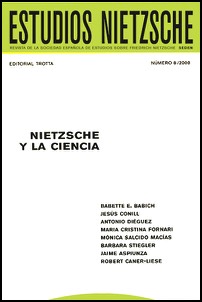Nietzsche and Darwinism
DOI:
https://doi.org/10.24310/EstudiosNIETen.vi8.10282Keywords:
moral feelings, evolutionism, teleologyAbstract
Since his youth years, Nietzsche considers Darwinism as the cultural atmosphere of his time. This «first range view», mediated through Lange and Rée, is not at all alien to his reflections about the origin and nature of moral feelings in his Human, All-too-Human. From 1880 onwards, Nietzsche’s interests focus on Spencer’s evolutionism. His criticism of Spencer’s views will end up by charging Darwinism with teleology and
a one-sided view regarding the struggle for survival. However, there is no doubt that Nietzsche found in Darwinism and in his age’s concerns more than one inspiring topic for his own personal thoughts.
Downloads
Metrics
References
Ansell-Pearson. K. Viroid Life. Perspectives on Nietzsche and the Transhuman Condition, London-NY, 1997.
Barbera, S. - G. Campioni, «L’“Anti-Darwin” di Friedrich Nietzsche»: Il Ponte 1 (1983), 30-37.
Du Mont, E., Der Fortschritt im Lichte der Lehren Schopenhauer’s und Darwin’s, 1876 (en la biblioteca personale de Nietzsche).
Fazio, D.M., Paul Rée. Un profilo filosofico, Bari: Palomar, 2003
Henke, D., «Nietzsches Darwinismuskritik aus der Sicht gegenwärtiger Evolutionsforschung»: Nietzsche-Studien 13 (1984), 189-210.
D. R. Johnson, «Nietzsche’s Early Darwinism: The “David Strauss” Essay of 1873»: Nietzsche-Studien 30 (2001);
Kaufmann, W., Nietzsche: Philosopher, Psychologist, Antichrist, Princeton, 1950. Prefacio.
Kelly, A., The Descent of Darwin. The popularization of Darwinism in Germany, 1860-1914, Chapel Hill, 1981.
Lange, F. A., Geschichte des Materialismus und Kritik seiner Bedeutung in der Gegenwart, Iserlohn und Leipzig, 1866.
Moore, G., - Th. H. Brobjer (ed.), Nietzsche and Science, Ashgate, 2004.
Moore, G., Nietzsche, Biology and Methaphor, Cambridge: Cambridge University Press, 2002.
Nietzsche F., Paul Rée, Lou von Salomé. Die Dokumente ihrer Begegnung, hrsg. von E. Pfeiffer, Frankfurt a/M., 1970.
Nietzsche, F., Obras Completas, I-IV (OC ). Director ed. Diego Sánchez Meca. Madrid: Tecnos, 2011-2016
Nietzsche, F., Correspondencia I-VI. (CO). Director ed. Luis E. de Santiago Guervós. Madrid : Trotta, 2005- 2012.
Nietzsche, F., Fragmentos Póstumos I-IV (FP). Director ed. Diego Sánchez Meca. Madrid: Tecnos, 2006-2010.
Stegmaier, W., «Darwin, Darwinismus, Nietzsche. Zum Problem der Evolution» : Nietzsche-Studien 16 (1987), 264-87.
Stiegler, B., Nietzsche et la biologie, Paris, 2001.
Downloads
Published
How to Cite
Issue
Section
License
As of issue 21 (2021) this journal is published only in open access (diamond route).
From that number 21, like the previous numbers published in NIETZSCHE STUDIES, they are subject to the Creative Commons Acknowledgment-NoComercia-ShareIgual 4.0 license, the full text of which can be consulted at <http://creativecommons.org/licenses/by-nc-sa/4.0 >
It is the responsibility of the authors to obtain the necessary permissions of the images that are subject to copyright.
This work is licensed under a Creative Commons Attribution-NonCommercial-ShareAlike 4.0 International License.
Copyright generates two different rights: moral rights and patrimonial rights that EJFB recognizes and respects. Moral rights are those relating to the recognition of the authorship. They are rights of a personal nature that are perpetual, inalienable, unseizable and imprescriptible as consequence of the indivisible union of the author and his/her work.
Patrimonial rights are those that can be derived from the reproduction, distribution, adaptation or communication of the work, among others.







11.png)
